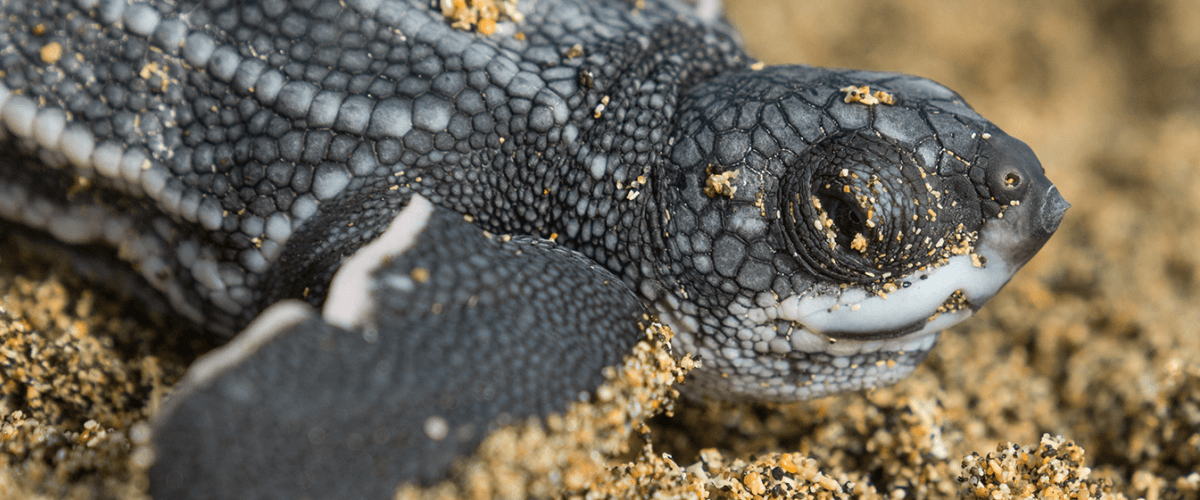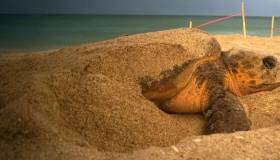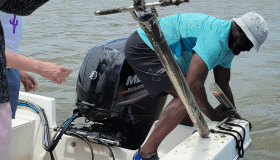
December 22, 2022 – Sea turtle rehabilitation facilities have helped thousands of sea turtles return to the wild over the years. But the road to recovery for stranded and/or injured sea turtles often is a months-long, coordinated process with the help of volunteers, veterinary professionals and governmental agencies.
Morris Animal Foundation has supported these efforts for more than two decades by funding sea turtle health studies. Our work improves care for injured and sick sea turtles and gives wildlife veterinary teams the tools they need so more sea turtles can successfully return to their lives in the oceans.
Here’s a snapshot of how we are helping sea turtles survive and thrive despite various threats through rescue, care and recovery:
Devastating Disease
One of our earliest funded studies tackled a disease called fibropapillomatosis (FP). All seven species of sea turtles are impacted by FP, which is characterized by wart-like tumors on the skin, eyes, mouth and organs. Some tumors remain small, while others can grow so large they seriously compromise vision, feeding and movement in affected animals. Out of all sea turtle species, juvenile green sea turtles seem to be the most commonly and severely impacted by FP.
Thanks to our funded researchers, we now know that a contagious herpesvirus is involved in FP outbreaks. The team also identified a leech that carries the same virus on many affected turtles, suggesting one route of FP transmission may involve this external parasite. In other funded studies, researchers developed an early diagnostic test that can detect antibodies to the FP-associated herpesvirus in the plasma of turtles. Together, these findings have informed measures to reduce the spread of FP in rescued turtles.
Despite decades of research, FP remains a conservation concern for sea turtles around the world. Continuing research suggests disease outbreaks may be additionally influenced by environmental factors, including habitat loss and pollution.
Red Tides
Brevetoxicosis is a condition caused by ingesting harmful toxins produced by algae blooms. These events, commonly known as red tides, occur annually in the Gulf of Mexico and appear to be increasing in frequency and duration. Exposure to brevetoxins – potent neurotoxins released by the algae – causes acute respiratory and neurological symptoms, and results in mass strandings (when affected animals either float or are washed ashore in a weakened state).
Early funded studies showed the majority of stranded sea turtles off the west coast of Florida during red tide events tested positive for red tide toxins. Sea birds tend to clear the red tide toxin from their bodies within 10 days of rehabilitation. However, the road to recovery for sea turtles is much longer; some sea turtles may take up to 50 days to clear the toxins. Turtles also can be affected by red tide events several months after an active bloom by consuming contaminated prey.
Recently, our funded researchers identified a novel red tide treatment called intravenous lipid emulsion (ILE) that improves survival rate and decreases time to release for sea turtles. Survival rates of affected turtles receiving ILE increased by nearly 50% over those receiving standard and supportive care and/or dehydration therapy. Nearly all symptoms of brevetoxicosis in ILE-treated turtles cleared up within a day or two, whereas symptoms took up to a week or more to clear in turtles receiving standard and supportive care. ILE is a promising new treatment that researchers hope will improve the care and recovery of sea turtles and other marine life affected by red tide events.
Cold Stunning
In other studies, our funded researchers studied turtles stranded because of a hypothermia-like state known as cold stunning. Because sea turtles are cold-blooded, they depend on external sources of heat to regulate body temperature. Some turtles do not migrate to warmer waters early enough in the fall, exposing themselves to sudden temperature drops and prolonged cold. Cold-stunned animals suffer from low body temperatures, reduced heart rate and blood circulation, and related physical problems; recovery rates vary greatly among individual turtles.
Researchers found that monitoring of corticosterone (a stress hormone) and thyroid hormones can be informative for tracking recovery from cold stunning in Kemp's ridley sea turtles. Elevated corticosterone levels that remained high during rehabilitative care significantly correlated with mortality in sea turtle patients. Lower levels of thyroid hormones appeared to be correlated with reduced feeding behavior. However, turtles that failed to eat and were supplemented with thyroxine, a thyroid hormone, began eating shortly after treatment. This new information is helping improve the management of and clinical care decisions for stranded and cold-stunned sea turtles.
In ongoing studies, funded researchers are looking at how another hormone called aldosterone, which regulates salt and water in the body and affects blood pressure, influences stress response and overall health of sea turtles. Together these studies are providing new clinical tools for monitoring the health of convalescing sea turtles in rehabilitation facilities from cold-stunning and other health challenges.
Transport Stress
Our funded researchers also studied how long distance transport to rehabilitation facilities and release sites affects endangered Kemp's ridleys and loggerhead sea turtles. The team found stress could be minimized in sea turtle patients with shorter transport times as well as by providing an overnight post-transport recovery period in a saltwater tank at release sites. Findings from this study are informing health recovery plans and best practices for transport methods, ensuring injured and/or sick sea turtles are better prepared for release back into the wild.
How You Can Help
All seven of the world’s sea turtle species are considered threatened or endangered. Learn more about all of our animal health research and ways you can support our efforts to give animals everywhere longer, healthier lives!




